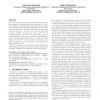Free Online Productivity Tools
i2Speak
i2Symbol
i2OCR
iTex2Img
iWeb2Print
iWeb2Shot
i2Type
iPdf2Split
iPdf2Merge
i2Bopomofo
i2Arabic
i2Style
i2Image
i2PDF
iLatex2Rtf
Sci2ools
122
click to vote
PODC
2010
ACM
2010
ACM
A new technique for distributed symmetry breaking
We introduce Multi-Trials, a new technique for symmetry breaking for distributed algorithms and apply it to various problems in general graphs. For instance, we present three randomized algorithms for distributed (vertex or edge) coloring improving on previous algorithms and showing a time/color trade-off. To get a ∆ + 1 coloring takes time O(log ∆ + √ log n). To obtain an O(∆ + log1+1/ log∗ n n) coloring takes time O(log∗ n). This is more than an exponential improvement in time for graphs of polylogarithmic degree. Our fastest algorithm works in constant time using O(∆ log(c) n + log1+1/c n) colors, where c denotes an arbitrary constant and log(c) n denotes the c times (recursively) applied logarithm to n. We also use the Multi-Trials technique to compute network decompositions and to compute maximal independent set (MIS), obtaining new results for several graph classes. Categories and Subject Descriptors F.2.2 [Analysis of Algorithms and Problem Complexity]: Nonnumeri...
Related Content
| Added | 16 Aug 2010 |
| Updated | 16 Aug 2010 |
| Type | Conference |
| Year | 2010 |
| Where | PODC |
| Authors | Johannes Schneider, Roger Wattenhofer |
Comments (0)

